MOD003325 Report: Gosport War Memorial Hospital Case Study Analysis
VerifiedAdded on 2023/04/21
|13
|2552
|378
Report
AI Summary
This report presents a case study analysis of the ethical issues at Gosport War Memorial Hospital. The report begins with an executive summary highlighting the importance of medical ethics in healthcare and then delves into the unethical practices, particularly the prescription of lethal doses of opioid drugs to elderly patients by Dr. Jane Barton. The analysis includes the implications of these actions, such as patient deaths and the failure of hospital staff to intervene. The report concludes with recommendations for addressing the identified ethical issues, including stricter administrative oversight, regulatory vigilance, and the implementation of well-defined ethical policies. The study underscores the need for accountability and ethical conduct within medical institutions to ensure patient safety and uphold professional standards. This report is a comprehensive examination of the ethical failures and provides a roadmap for preventing similar incidents in the future.
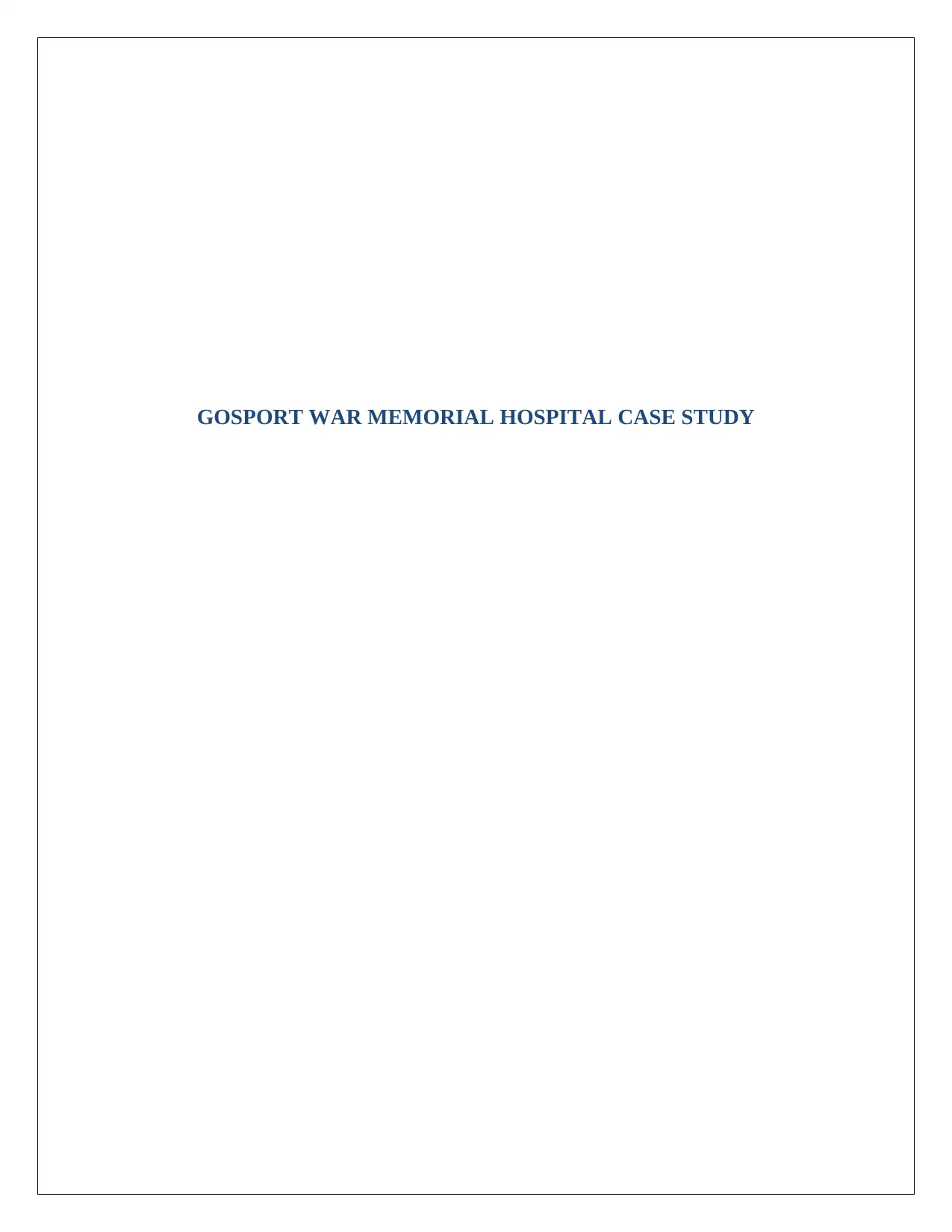
GOSPORT WAR MEMORIAL HOSPITAL CASE STUDY
Paraphrase This Document
Need a fresh take? Get an instant paraphrase of this document with our AI Paraphraser
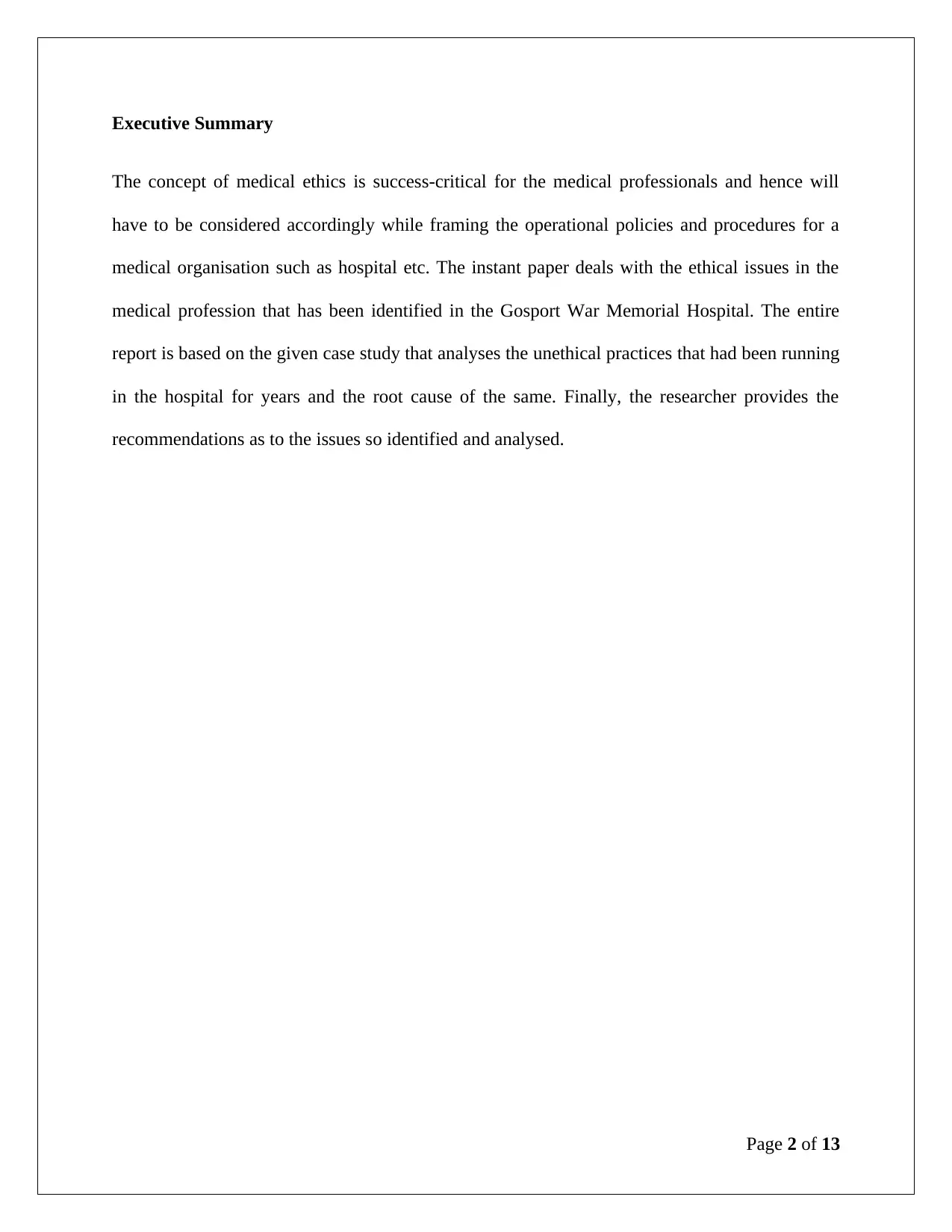
Executive Summary
The concept of medical ethics is success-critical for the medical professionals and hence will
have to be considered accordingly while framing the operational policies and procedures for a
medical organisation such as hospital etc. The instant paper deals with the ethical issues in the
medical profession that has been identified in the Gosport War Memorial Hospital. The entire
report is based on the given case study that analyses the unethical practices that had been running
in the hospital for years and the root cause of the same. Finally, the researcher provides the
recommendations as to the issues so identified and analysed.
Page 2 of 13
The concept of medical ethics is success-critical for the medical professionals and hence will
have to be considered accordingly while framing the operational policies and procedures for a
medical organisation such as hospital etc. The instant paper deals with the ethical issues in the
medical profession that has been identified in the Gosport War Memorial Hospital. The entire
report is based on the given case study that analyses the unethical practices that had been running
in the hospital for years and the root cause of the same. Finally, the researcher provides the
recommendations as to the issues so identified and analysed.
Page 2 of 13

Table of Contents
1.0 Introduction................................................................................................................................4
2.0 Analysis.....................................................................................................................................5
2.1 Ethical issues in hospital........................................................................................................5
2.2 Implications of this issue.......................................................................................................7
3.0 Conclusion.................................................................................................................................9
4.0 Recommendations....................................................................................................................10
References......................................................................................................................................11
Page 3 of 13
1.0 Introduction................................................................................................................................4
2.0 Analysis.....................................................................................................................................5
2.1 Ethical issues in hospital........................................................................................................5
2.2 Implications of this issue.......................................................................................................7
3.0 Conclusion.................................................................................................................................9
4.0 Recommendations....................................................................................................................10
References......................................................................................................................................11
Page 3 of 13
⊘ This is a preview!⊘
Do you want full access?
Subscribe today to unlock all pages.

Trusted by 1+ million students worldwide
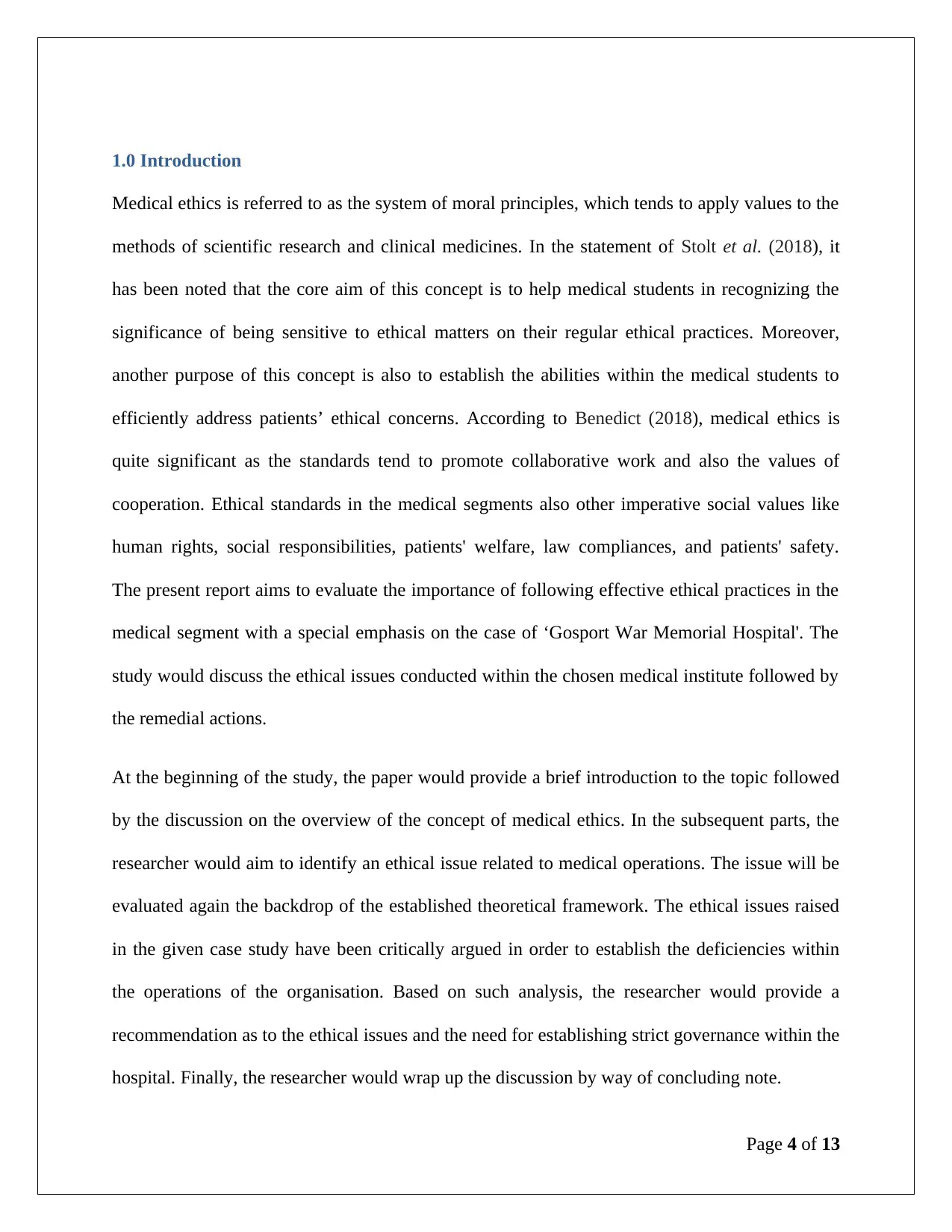
1.0 Introduction
Medical ethics is referred to as the system of moral principles, which tends to apply values to the
methods of scientific research and clinical medicines. In the statement of Stolt et al. (2018), it
has been noted that the core aim of this concept is to help medical students in recognizing the
significance of being sensitive to ethical matters on their regular ethical practices. Moreover,
another purpose of this concept is also to establish the abilities within the medical students to
efficiently address patients’ ethical concerns. According to Benedict (2018), medical ethics is
quite significant as the standards tend to promote collaborative work and also the values of
cooperation. Ethical standards in the medical segments also other imperative social values like
human rights, social responsibilities, patients' welfare, law compliances, and patients' safety.
The present report aims to evaluate the importance of following effective ethical practices in the
medical segment with a special emphasis on the case of ‘Gosport War Memorial Hospital'. The
study would discuss the ethical issues conducted within the chosen medical institute followed by
the remedial actions.
At the beginning of the study, the paper would provide a brief introduction to the topic followed
by the discussion on the overview of the concept of medical ethics. In the subsequent parts, the
researcher would aim to identify an ethical issue related to medical operations. The issue will be
evaluated again the backdrop of the established theoretical framework. The ethical issues raised
in the given case study have been critically argued in order to establish the deficiencies within
the operations of the organisation. Based on such analysis, the researcher would provide a
recommendation as to the ethical issues and the need for establishing strict governance within the
hospital. Finally, the researcher would wrap up the discussion by way of concluding note.
Page 4 of 13
Medical ethics is referred to as the system of moral principles, which tends to apply values to the
methods of scientific research and clinical medicines. In the statement of Stolt et al. (2018), it
has been noted that the core aim of this concept is to help medical students in recognizing the
significance of being sensitive to ethical matters on their regular ethical practices. Moreover,
another purpose of this concept is also to establish the abilities within the medical students to
efficiently address patients’ ethical concerns. According to Benedict (2018), medical ethics is
quite significant as the standards tend to promote collaborative work and also the values of
cooperation. Ethical standards in the medical segments also other imperative social values like
human rights, social responsibilities, patients' welfare, law compliances, and patients' safety.
The present report aims to evaluate the importance of following effective ethical practices in the
medical segment with a special emphasis on the case of ‘Gosport War Memorial Hospital'. The
study would discuss the ethical issues conducted within the chosen medical institute followed by
the remedial actions.
At the beginning of the study, the paper would provide a brief introduction to the topic followed
by the discussion on the overview of the concept of medical ethics. In the subsequent parts, the
researcher would aim to identify an ethical issue related to medical operations. The issue will be
evaluated again the backdrop of the established theoretical framework. The ethical issues raised
in the given case study have been critically argued in order to establish the deficiencies within
the operations of the organisation. Based on such analysis, the researcher would provide a
recommendation as to the ethical issues and the need for establishing strict governance within the
hospital. Finally, the researcher would wrap up the discussion by way of concluding note.
Page 4 of 13
Paraphrase This Document
Need a fresh take? Get an instant paraphrase of this document with our AI Paraphraser

Page 5 of 13
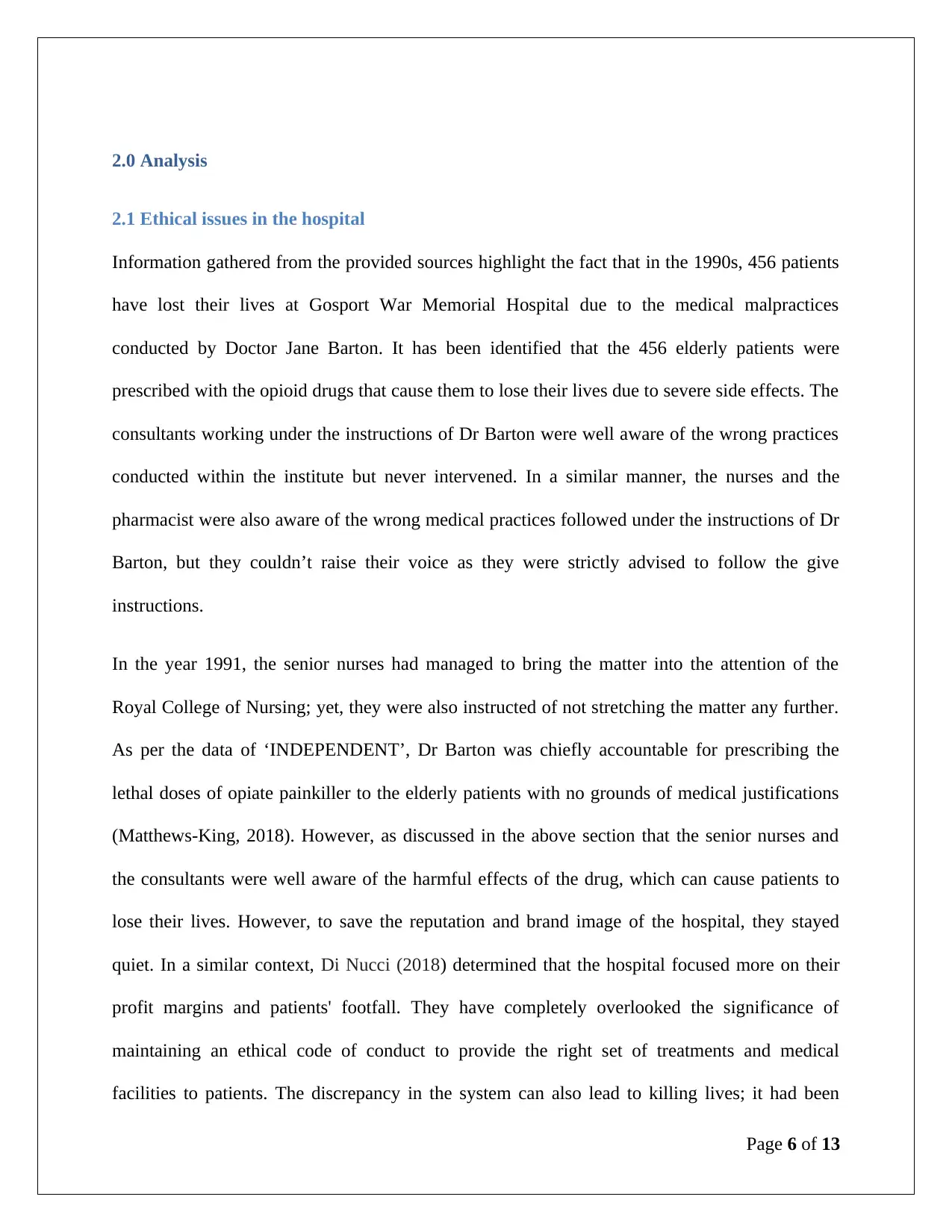
2.0 Analysis
2.1 Ethical issues in the hospital
Information gathered from the provided sources highlight the fact that in the 1990s, 456 patients
have lost their lives at Gosport War Memorial Hospital due to the medical malpractices
conducted by Doctor Jane Barton. It has been identified that the 456 elderly patients were
prescribed with the opioid drugs that cause them to lose their lives due to severe side effects. The
consultants working under the instructions of Dr Barton were well aware of the wrong practices
conducted within the institute but never intervened. In a similar manner, the nurses and the
pharmacist were also aware of the wrong medical practices followed under the instructions of Dr
Barton, but they couldn’t raise their voice as they were strictly advised to follow the give
instructions.
In the year 1991, the senior nurses had managed to bring the matter into the attention of the
Royal College of Nursing; yet, they were also instructed of not stretching the matter any further.
As per the data of ‘INDEPENDENT’, Dr Barton was chiefly accountable for prescribing the
lethal doses of opiate painkiller to the elderly patients with no grounds of medical justifications
(Matthews-King, 2018). However, as discussed in the above section that the senior nurses and
the consultants were well aware of the harmful effects of the drug, which can cause patients to
lose their lives. However, to save the reputation and brand image of the hospital, they stayed
quiet. In a similar context, Di Nucci (2018) determined that the hospital focused more on their
profit margins and patients' footfall. They have completely overlooked the significance of
maintaining an ethical code of conduct to provide the right set of treatments and medical
facilities to patients. The discrepancy in the system can also lead to killing lives; it had been
Page 6 of 13
2.1 Ethical issues in the hospital
Information gathered from the provided sources highlight the fact that in the 1990s, 456 patients
have lost their lives at Gosport War Memorial Hospital due to the medical malpractices
conducted by Doctor Jane Barton. It has been identified that the 456 elderly patients were
prescribed with the opioid drugs that cause them to lose their lives due to severe side effects. The
consultants working under the instructions of Dr Barton were well aware of the wrong practices
conducted within the institute but never intervened. In a similar manner, the nurses and the
pharmacist were also aware of the wrong medical practices followed under the instructions of Dr
Barton, but they couldn’t raise their voice as they were strictly advised to follow the give
instructions.
In the year 1991, the senior nurses had managed to bring the matter into the attention of the
Royal College of Nursing; yet, they were also instructed of not stretching the matter any further.
As per the data of ‘INDEPENDENT’, Dr Barton was chiefly accountable for prescribing the
lethal doses of opiate painkiller to the elderly patients with no grounds of medical justifications
(Matthews-King, 2018). However, as discussed in the above section that the senior nurses and
the consultants were well aware of the harmful effects of the drug, which can cause patients to
lose their lives. However, to save the reputation and brand image of the hospital, they stayed
quiet. In a similar context, Di Nucci (2018) determined that the hospital focused more on their
profit margins and patients' footfall. They have completely overlooked the significance of
maintaining an ethical code of conduct to provide the right set of treatments and medical
facilities to patients. The discrepancy in the system can also lead to killing lives; it had been
Page 6 of 13
⊘ This is a preview!⊘
Do you want full access?
Subscribe today to unlock all pages.

Trusted by 1+ million students worldwide
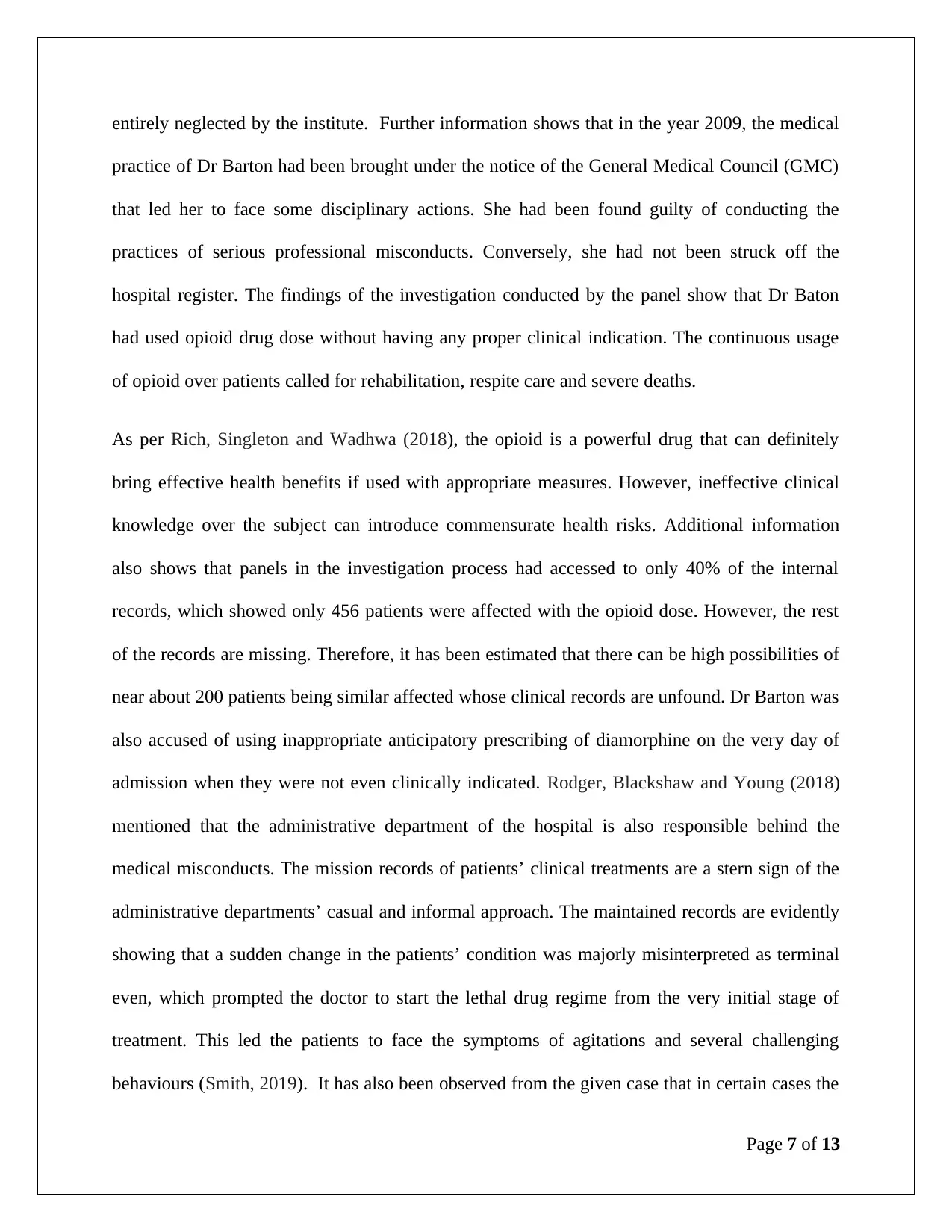
entirely neglected by the institute. Further information shows that in the year 2009, the medical
practice of Dr Barton had been brought under the notice of the General Medical Council (GMC)
that led her to face some disciplinary actions. She had been found guilty of conducting the
practices of serious professional misconducts. Conversely, she had not been struck off the
hospital register. The findings of the investigation conducted by the panel show that Dr Baton
had used opioid drug dose without having any proper clinical indication. The continuous usage
of opioid over patients called for rehabilitation, respite care and severe deaths.
As per Rich, Singleton and Wadhwa (2018), the opioid is a powerful drug that can definitely
bring effective health benefits if used with appropriate measures. However, ineffective clinical
knowledge over the subject can introduce commensurate health risks. Additional information
also shows that panels in the investigation process had accessed to only 40% of the internal
records, which showed only 456 patients were affected with the opioid dose. However, the rest
of the records are missing. Therefore, it has been estimated that there can be high possibilities of
near about 200 patients being similar affected whose clinical records are unfound. Dr Barton was
also accused of using inappropriate anticipatory prescribing of diamorphine on the very day of
admission when they were not even clinically indicated. Rodger, Blackshaw and Young (2018)
mentioned that the administrative department of the hospital is also responsible behind the
medical misconducts. The mission records of patients’ clinical treatments are a stern sign of the
administrative departments’ casual and informal approach. The maintained records are evidently
showing that a sudden change in the patients’ condition was majorly misinterpreted as terminal
even, which prompted the doctor to start the lethal drug regime from the very initial stage of
treatment. This led the patients to face the symptoms of agitations and several challenging
behaviours (Smith, 2019). It has also been observed from the given case that in certain cases the
Page 7 of 13
practice of Dr Barton had been brought under the notice of the General Medical Council (GMC)
that led her to face some disciplinary actions. She had been found guilty of conducting the
practices of serious professional misconducts. Conversely, she had not been struck off the
hospital register. The findings of the investigation conducted by the panel show that Dr Baton
had used opioid drug dose without having any proper clinical indication. The continuous usage
of opioid over patients called for rehabilitation, respite care and severe deaths.
As per Rich, Singleton and Wadhwa (2018), the opioid is a powerful drug that can definitely
bring effective health benefits if used with appropriate measures. However, ineffective clinical
knowledge over the subject can introduce commensurate health risks. Additional information
also shows that panels in the investigation process had accessed to only 40% of the internal
records, which showed only 456 patients were affected with the opioid dose. However, the rest
of the records are missing. Therefore, it has been estimated that there can be high possibilities of
near about 200 patients being similar affected whose clinical records are unfound. Dr Barton was
also accused of using inappropriate anticipatory prescribing of diamorphine on the very day of
admission when they were not even clinically indicated. Rodger, Blackshaw and Young (2018)
mentioned that the administrative department of the hospital is also responsible behind the
medical misconducts. The mission records of patients’ clinical treatments are a stern sign of the
administrative departments’ casual and informal approach. The maintained records are evidently
showing that a sudden change in the patients’ condition was majorly misinterpreted as terminal
even, which prompted the doctor to start the lethal drug regime from the very initial stage of
treatment. This led the patients to face the symptoms of agitations and several challenging
behaviours (Smith, 2019). It has also been observed from the given case that in certain cases the
Page 7 of 13
Paraphrase This Document
Need a fresh take? Get an instant paraphrase of this document with our AI Paraphraser
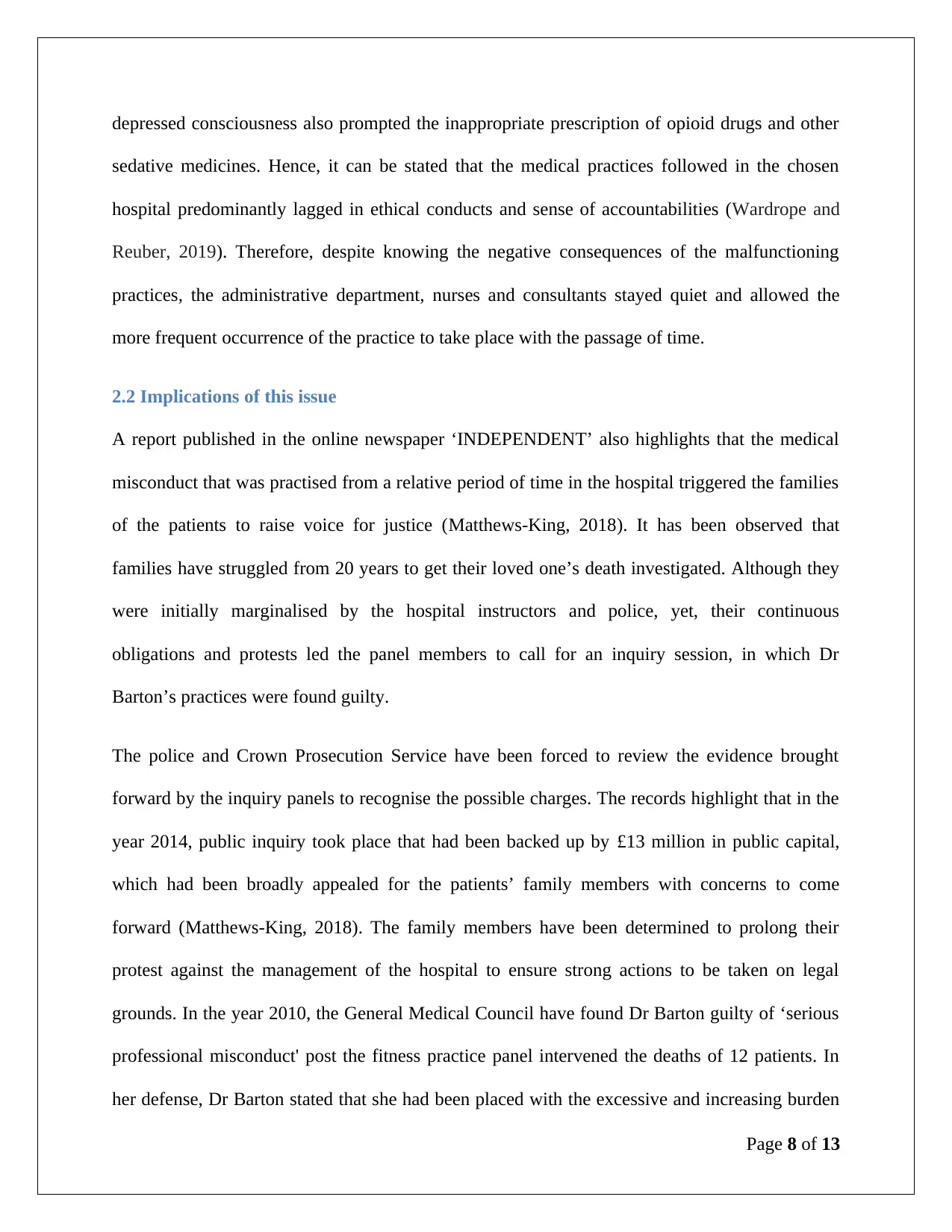
depressed consciousness also prompted the inappropriate prescription of opioid drugs and other
sedative medicines. Hence, it can be stated that the medical practices followed in the chosen
hospital predominantly lagged in ethical conducts and sense of accountabilities (Wardrope and
Reuber, 2019). Therefore, despite knowing the negative consequences of the malfunctioning
practices, the administrative department, nurses and consultants stayed quiet and allowed the
more frequent occurrence of the practice to take place with the passage of time.
2.2 Implications of this issue
A report published in the online newspaper ‘INDEPENDENT’ also highlights that the medical
misconduct that was practised from a relative period of time in the hospital triggered the families
of the patients to raise voice for justice (Matthews-King, 2018). It has been observed that
families have struggled from 20 years to get their loved one’s death investigated. Although they
were initially marginalised by the hospital instructors and police, yet, their continuous
obligations and protests led the panel members to call for an inquiry session, in which Dr
Barton’s practices were found guilty.
The police and Crown Prosecution Service have been forced to review the evidence brought
forward by the inquiry panels to recognise the possible charges. The records highlight that in the
year 2014, public inquiry took place that had been backed up by £13 million in public capital,
which had been broadly appealed for the patients’ family members with concerns to come
forward (Matthews-King, 2018). The family members have been determined to prolong their
protest against the management of the hospital to ensure strong actions to be taken on legal
grounds. In the year 2010, the General Medical Council have found Dr Barton guilty of ‘serious
professional misconduct' post the fitness practice panel intervened the deaths of 12 patients. In
her defense, Dr Barton stated that she had been placed with the excessive and increasing burden
Page 8 of 13
sedative medicines. Hence, it can be stated that the medical practices followed in the chosen
hospital predominantly lagged in ethical conducts and sense of accountabilities (Wardrope and
Reuber, 2019). Therefore, despite knowing the negative consequences of the malfunctioning
practices, the administrative department, nurses and consultants stayed quiet and allowed the
more frequent occurrence of the practice to take place with the passage of time.
2.2 Implications of this issue
A report published in the online newspaper ‘INDEPENDENT’ also highlights that the medical
misconduct that was practised from a relative period of time in the hospital triggered the families
of the patients to raise voice for justice (Matthews-King, 2018). It has been observed that
families have struggled from 20 years to get their loved one’s death investigated. Although they
were initially marginalised by the hospital instructors and police, yet, their continuous
obligations and protests led the panel members to call for an inquiry session, in which Dr
Barton’s practices were found guilty.
The police and Crown Prosecution Service have been forced to review the evidence brought
forward by the inquiry panels to recognise the possible charges. The records highlight that in the
year 2014, public inquiry took place that had been backed up by £13 million in public capital,
which had been broadly appealed for the patients’ family members with concerns to come
forward (Matthews-King, 2018). The family members have been determined to prolong their
protest against the management of the hospital to ensure strong actions to be taken on legal
grounds. In the year 2010, the General Medical Council have found Dr Barton guilty of ‘serious
professional misconduct' post the fitness practice panel intervened the deaths of 12 patients. In
her defense, Dr Barton stated that she had been placed with the excessive and increasing burden
Page 8 of 13
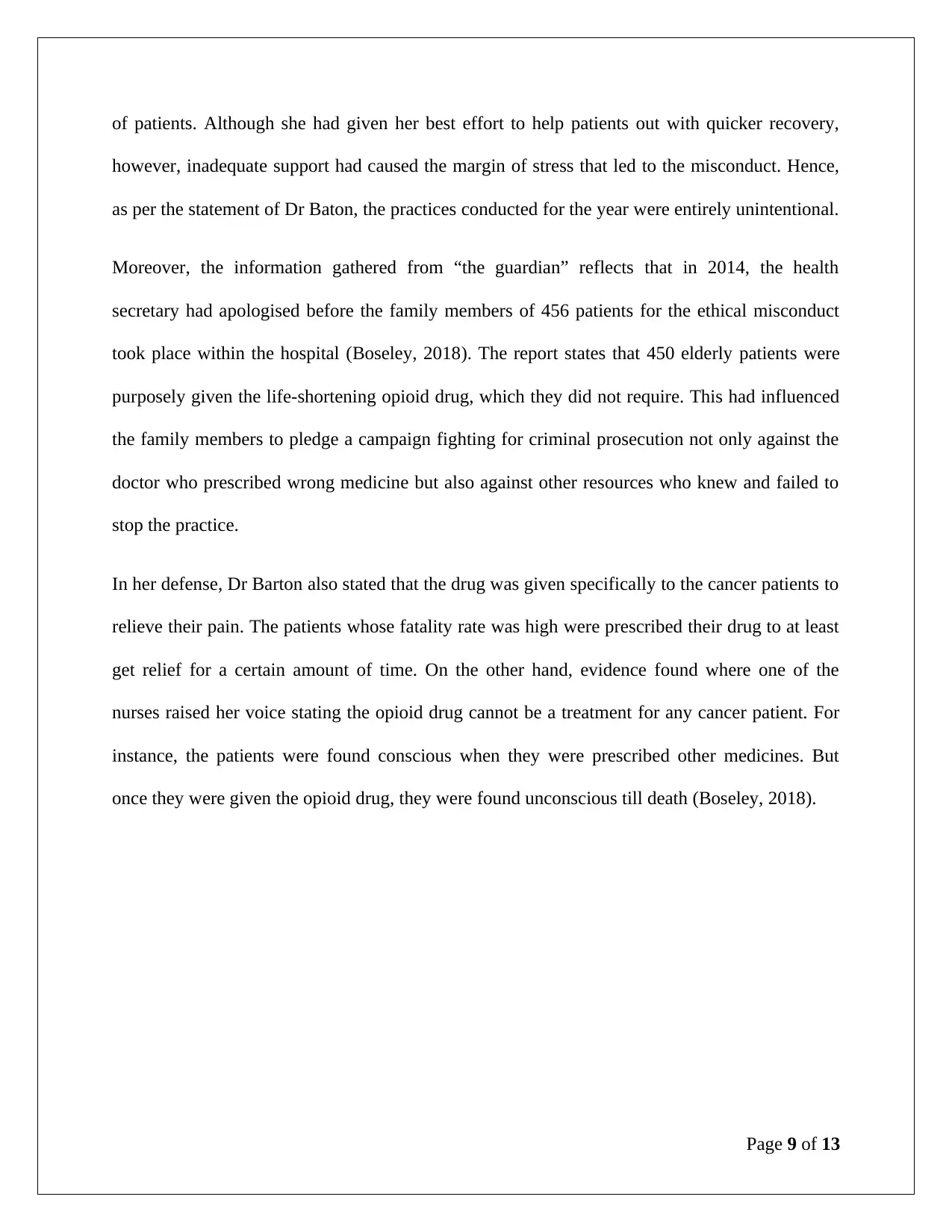
of patients. Although she had given her best effort to help patients out with quicker recovery,
however, inadequate support had caused the margin of stress that led to the misconduct. Hence,
as per the statement of Dr Baton, the practices conducted for the year were entirely unintentional.
Moreover, the information gathered from “the guardian” reflects that in 2014, the health
secretary had apologised before the family members of 456 patients for the ethical misconduct
took place within the hospital (Boseley, 2018). The report states that 450 elderly patients were
purposely given the life-shortening opioid drug, which they did not require. This had influenced
the family members to pledge a campaign fighting for criminal prosecution not only against the
doctor who prescribed wrong medicine but also against other resources who knew and failed to
stop the practice.
In her defense, Dr Barton also stated that the drug was given specifically to the cancer patients to
relieve their pain. The patients whose fatality rate was high were prescribed their drug to at least
get relief for a certain amount of time. On the other hand, evidence found where one of the
nurses raised her voice stating the opioid drug cannot be a treatment for any cancer patient. For
instance, the patients were found conscious when they were prescribed other medicines. But
once they were given the opioid drug, they were found unconscious till death (Boseley, 2018).
Page 9 of 13
however, inadequate support had caused the margin of stress that led to the misconduct. Hence,
as per the statement of Dr Baton, the practices conducted for the year were entirely unintentional.
Moreover, the information gathered from “the guardian” reflects that in 2014, the health
secretary had apologised before the family members of 456 patients for the ethical misconduct
took place within the hospital (Boseley, 2018). The report states that 450 elderly patients were
purposely given the life-shortening opioid drug, which they did not require. This had influenced
the family members to pledge a campaign fighting for criminal prosecution not only against the
doctor who prescribed wrong medicine but also against other resources who knew and failed to
stop the practice.
In her defense, Dr Barton also stated that the drug was given specifically to the cancer patients to
relieve their pain. The patients whose fatality rate was high were prescribed their drug to at least
get relief for a certain amount of time. On the other hand, evidence found where one of the
nurses raised her voice stating the opioid drug cannot be a treatment for any cancer patient. For
instance, the patients were found conscious when they were prescribed other medicines. But
once they were given the opioid drug, they were found unconscious till death (Boseley, 2018).
Page 9 of 13
⊘ This is a preview!⊘
Do you want full access?
Subscribe today to unlock all pages.

Trusted by 1+ million students worldwide
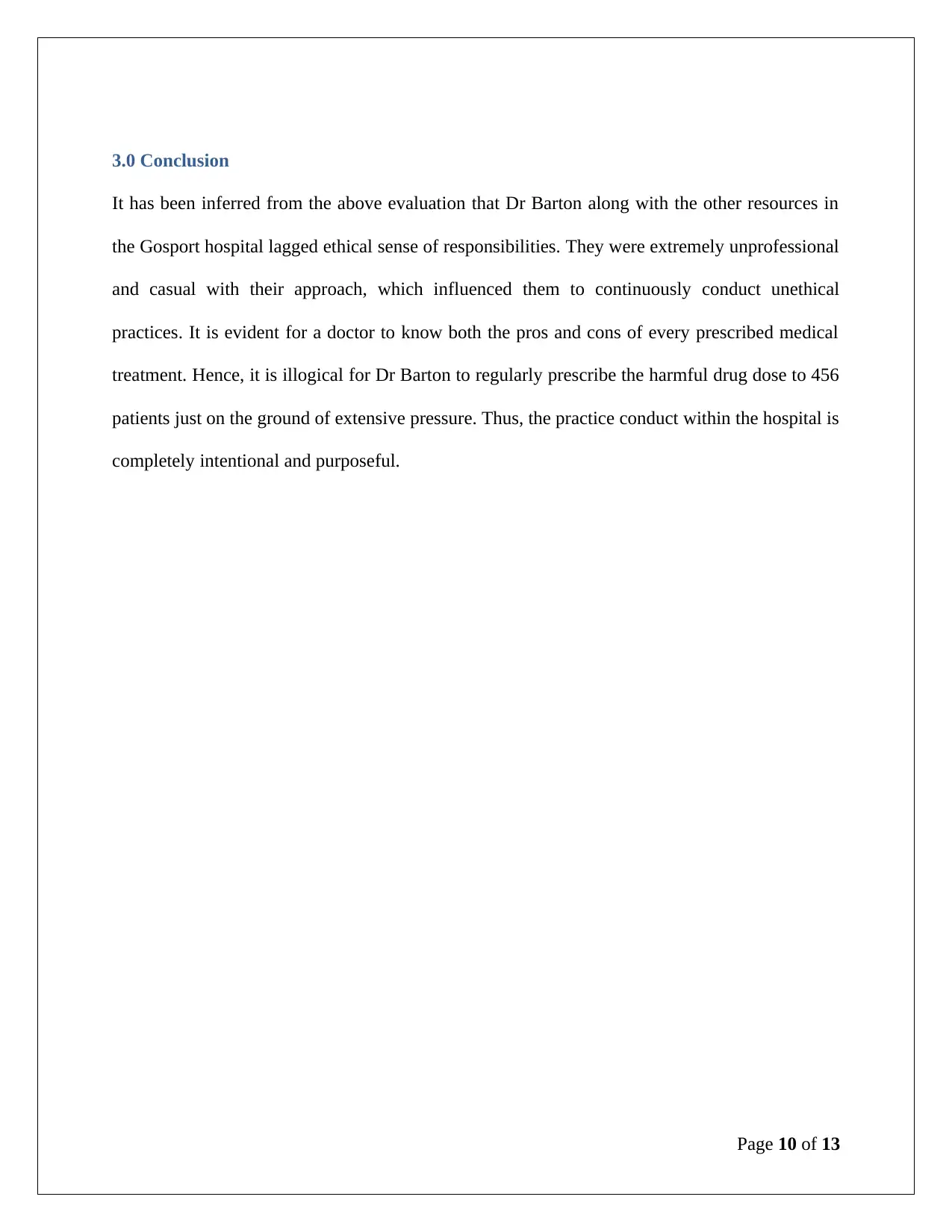
3.0 Conclusion
It has been inferred from the above evaluation that Dr Barton along with the other resources in
the Gosport hospital lagged ethical sense of responsibilities. They were extremely unprofessional
and casual with their approach, which influenced them to continuously conduct unethical
practices. It is evident for a doctor to know both the pros and cons of every prescribed medical
treatment. Hence, it is illogical for Dr Barton to regularly prescribe the harmful drug dose to 456
patients just on the ground of extensive pressure. Thus, the practice conduct within the hospital is
completely intentional and purposeful.
Page 10 of 13
It has been inferred from the above evaluation that Dr Barton along with the other resources in
the Gosport hospital lagged ethical sense of responsibilities. They were extremely unprofessional
and casual with their approach, which influenced them to continuously conduct unethical
practices. It is evident for a doctor to know both the pros and cons of every prescribed medical
treatment. Hence, it is illogical for Dr Barton to regularly prescribe the harmful drug dose to 456
patients just on the ground of extensive pressure. Thus, the practice conduct within the hospital is
completely intentional and purposeful.
Page 10 of 13
Paraphrase This Document
Need a fresh take? Get an instant paraphrase of this document with our AI Paraphraser
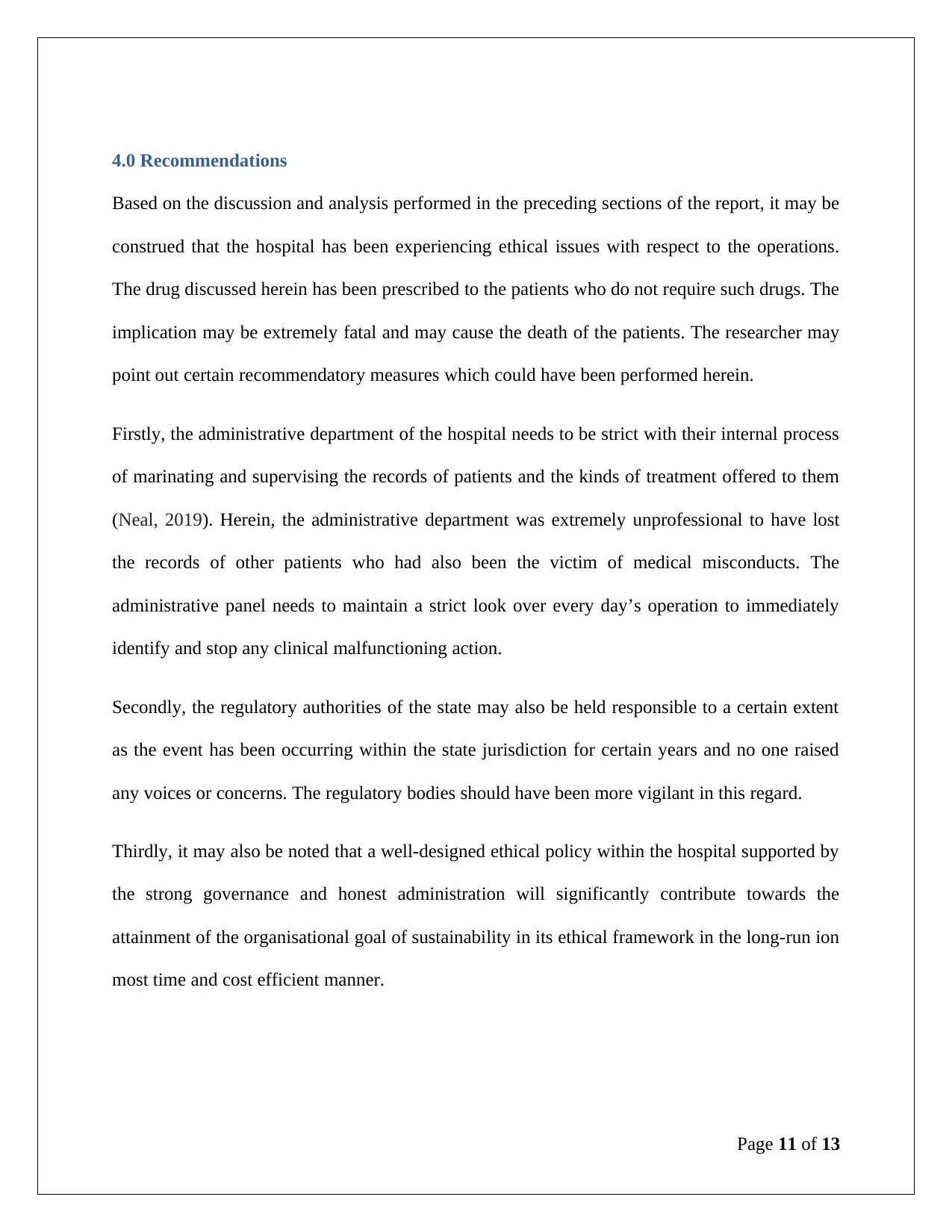
4.0 Recommendations
Based on the discussion and analysis performed in the preceding sections of the report, it may be
construed that the hospital has been experiencing ethical issues with respect to the operations.
The drug discussed herein has been prescribed to the patients who do not require such drugs. The
implication may be extremely fatal and may cause the death of the patients. The researcher may
point out certain recommendatory measures which could have been performed herein.
Firstly, the administrative department of the hospital needs to be strict with their internal process
of marinating and supervising the records of patients and the kinds of treatment offered to them
(Neal, 2019). Herein, the administrative department was extremely unprofessional to have lost
the records of other patients who had also been the victim of medical misconducts. The
administrative panel needs to maintain a strict look over every day’s operation to immediately
identify and stop any clinical malfunctioning action.
Secondly, the regulatory authorities of the state may also be held responsible to a certain extent
as the event has been occurring within the state jurisdiction for certain years and no one raised
any voices or concerns. The regulatory bodies should have been more vigilant in this regard.
Thirdly, it may also be noted that a well-designed ethical policy within the hospital supported by
the strong governance and honest administration will significantly contribute towards the
attainment of the organisational goal of sustainability in its ethical framework in the long-run ion
most time and cost efficient manner.
Page 11 of 13
Based on the discussion and analysis performed in the preceding sections of the report, it may be
construed that the hospital has been experiencing ethical issues with respect to the operations.
The drug discussed herein has been prescribed to the patients who do not require such drugs. The
implication may be extremely fatal and may cause the death of the patients. The researcher may
point out certain recommendatory measures which could have been performed herein.
Firstly, the administrative department of the hospital needs to be strict with their internal process
of marinating and supervising the records of patients and the kinds of treatment offered to them
(Neal, 2019). Herein, the administrative department was extremely unprofessional to have lost
the records of other patients who had also been the victim of medical misconducts. The
administrative panel needs to maintain a strict look over every day’s operation to immediately
identify and stop any clinical malfunctioning action.
Secondly, the regulatory authorities of the state may also be held responsible to a certain extent
as the event has been occurring within the state jurisdiction for certain years and no one raised
any voices or concerns. The regulatory bodies should have been more vigilant in this regard.
Thirdly, it may also be noted that a well-designed ethical policy within the hospital supported by
the strong governance and honest administration will significantly contribute towards the
attainment of the organisational goal of sustainability in its ethical framework in the long-run ion
most time and cost efficient manner.
Page 11 of 13

References
Benedict, J., (2018). Plain Anabaptists and Healthcare Ethics. The Journal of clinical
ethics, 29(3), pp.201-205.
Boseley, S. (2018). Gosport hospital: more than 450 patients died due to opioid drugs policy.
[online] the Guardian. Available at: https://www.theguardian.com/society/2018/jun/20/gosport-
war-memorial-hospital-opioid-drugs-policy-inquiry [Accessed 3 Apr. 2019].
Di Nucci, E., (2018). Ethics in Healthcare: A Philosophical Introduction.
Matthews-King, A. (2018). Hampshire police to 'step back' from an investigation into Gosport
deaths. [online] The Independent. Available at:
https://www.independent.co.uk/news/health/gosport-hospital-scandal-latest-hampshire-police-
jane-barton-investigation-deaths-a8410856.html [Accessed 3 Apr. 2019].
Neal, M., (2019). The idea of vulnerability in healthcare law and ethics: from the margins to the
mainstream?.
Rich, C.R., Singleton, J.K. and Wadhwa, S.S., (2018). Sustainability for healthcare
management: a leadership imperative. Routledge.
Rodger, D., Blackshaw, B. and Young, A., (2018). Moral distress in healthcare assistants: a
discussion with recommendations. Nursing ethics, p.0969733018791339.
Smith, M.A., (2019). The promotion of social justice in healthcare. Nursing made Incredibly
Easy, 17(2), pp.26-32.
Page 12 of 13
Benedict, J., (2018). Plain Anabaptists and Healthcare Ethics. The Journal of clinical
ethics, 29(3), pp.201-205.
Boseley, S. (2018). Gosport hospital: more than 450 patients died due to opioid drugs policy.
[online] the Guardian. Available at: https://www.theguardian.com/society/2018/jun/20/gosport-
war-memorial-hospital-opioid-drugs-policy-inquiry [Accessed 3 Apr. 2019].
Di Nucci, E., (2018). Ethics in Healthcare: A Philosophical Introduction.
Matthews-King, A. (2018). Hampshire police to 'step back' from an investigation into Gosport
deaths. [online] The Independent. Available at:
https://www.independent.co.uk/news/health/gosport-hospital-scandal-latest-hampshire-police-
jane-barton-investigation-deaths-a8410856.html [Accessed 3 Apr. 2019].
Neal, M., (2019). The idea of vulnerability in healthcare law and ethics: from the margins to the
mainstream?.
Rich, C.R., Singleton, J.K. and Wadhwa, S.S., (2018). Sustainability for healthcare
management: a leadership imperative. Routledge.
Rodger, D., Blackshaw, B. and Young, A., (2018). Moral distress in healthcare assistants: a
discussion with recommendations. Nursing ethics, p.0969733018791339.
Smith, M.A., (2019). The promotion of social justice in healthcare. Nursing made Incredibly
Easy, 17(2), pp.26-32.
Page 12 of 13
⊘ This is a preview!⊘
Do you want full access?
Subscribe today to unlock all pages.

Trusted by 1+ million students worldwide
1 out of 13
Related Documents
Your All-in-One AI-Powered Toolkit for Academic Success.
+13062052269
info@desklib.com
Available 24*7 on WhatsApp / Email
![[object Object]](/_next/static/media/star-bottom.7253800d.svg)
Unlock your academic potential
Copyright © 2020–2026 A2Z Services. All Rights Reserved. Developed and managed by ZUCOL.


